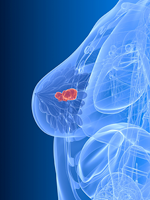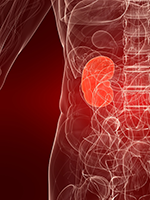Immunotherapy
By Phoebe Starr
San Francisco, CA—Although there is a biological rationale that supports the “abscopal” effects of radiation therapy plus checkpoint immunotherapy in fighting cancer, this combination showed mixed results and no robust effects in patients with metastatic renal-cell carcinoma (RCC), according to results of 2 preliminary studies presented at the 2020 Genitourinary Cancers Symposium. Read More ›
By Wayne Kuznar
San Francisco, CA—Second-line treatment with a 3-drug regimen that included the PD-1 inhibitor nivolumab (Opdivo), the VEGF receptor antagonist ramucirumab (Cyramza), and chemotherapy with the taxane paclitaxel, showed durable and impressive response rates, regardless of PD-L1 expression, in patients with advanced gastric cancers. Read More ›
The FDA has granted priority review to Merck’s supplemental Biologics License Application for the anti-PD–1 agent pembrolizumab as monotherapy for certain patients with high-risk, non-muscle invasive bladder cancer who are ineligible for or have elected not to undergo cystectomy. Read More ›
By Chase Doyle
Chimeric antigen receptor (CAR) T-cell therapy is a type of immunotherapy that uses a patient’s own genetically modified T-cells to fight cancer. Read More ›
By Wayne Kuznar
Chimeric antigen receptor (CAR) T-cell therapy is associated with unique adverse events that require vigilant monitoring, aggressive care, and specialized management. Marco L. Davila, MD, PhD, Medical Oncologist, Blood and Marrow Transplant and Cellular Immunotherapy Program, Moffitt Cancer Center, Tampa, FL, provided an overview of this topic at the 2019 ASCO-SITC Clinical Immuno-Oncology Symposium. Read More ›
By Wayne Kuznar
Promising markers of response to immune checkpoint inhibition include tumor mutation burden (TMB) and genomic markers that reflect a disruption of the tumor immunity cycle, said Natalie Vokes, MD, MPhil, Medical Oncology Fellow, Dana-Farber Cancer Institute, Boston, at the 2019 ASCO-SITC Clinical Immuno-Oncology Symposium. Read More ›
By Wayne Kuznar
Many patients with leukemia or lymphoma who receive treatment with anti-CD19 chimeric antigen receptor (CAR) T-cell therapy achieve minimum residual disease (MRD) negativity, and many are in complete remission well beyond 12 months. As such, CAR T-cell therapies are curing these patients. Read More ›
By Phoebe Starr
Triple-negative breast cancer is considered one of the most difficult to treat breast cancers, with few treatment options, but finally a breakthrough study shows progress by extending patient survival. Read More ›
By Wayne Kuznar
Combining an immune checkpoint inhibitor and a tyrosine kinase inhibitor (TKI) significantly improved progression-free survival (PFS) in treatment-naïve patients with advanced renal-cell carcinoma (RCC) compared with a TKI alone. Read More ›
The combination of immunotherapy with nivolumab (Opdivo) and ipilimumab (Yervoy) may soon represent a new first-line treatment option in patients with early-stage metastatic colorectal cancer (CRC) associated with microsatellite instability-high (MSI-H) or mismatch repair-deficient (dMMR) tumors. Read More ›



